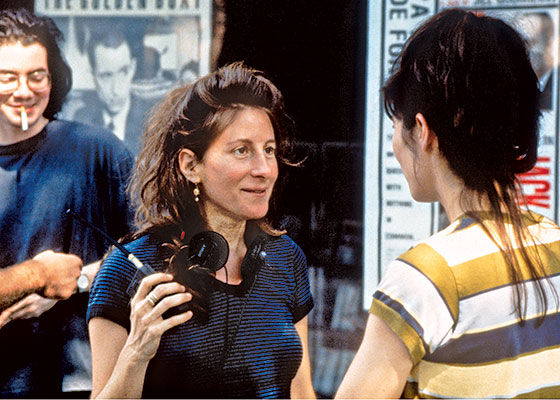 |
Holofcener on the set of Walking and Talking.
(Photo: Courtesy of Nicole Holofcener) |
The first shot of my first film, Walking and Talking, I remember pinching myself, walking to the set. It was right in my neighborhood, and I remember directing the scene between Liev Schreiber and Catherine Keener and feeling like the luckiest person in the world to be doing what I wanted to be doing. I was kind of in shock that I was able to take something from my own life, hire actors, put them on a New York City street surrounded by 60 people who are helping me tell this thing that happened to me. It was overwhelming and scary, but incredibly gratifying and exciting.
I never remember anything, but I remember this — it was a scene where Liev and Catherine go to an ATM. She’s lending him money. And then she discovers that she’s lending him money so he can pay his phone bill because he had phone sex with this other woman. And she’s disgusted and outraged and jealous, and she goes to get the money back. The character Liev plays, Andrew, was based on a real person in my life. By the time I wrote the script, though, he and I were friends. But I was amazed that the words were the way I wanted them to be; they’re saying words that I wrote, and no one was getting in our way.
But I had so overprepared. I felt that I had better have storyboards and shot lists down to every time, just in case I lose my marbles when it comes time to know what I’m doing.
I thought I had to have every answer. I had to know every backstory of every character, the motivation of every line, what every scene was about. Some of that took the joy and spontaneity and fun out of what I was doing. Most actors just want to say their lines the best they can, be directed, go home, and come back the next day. Not too many people I know want to spend two weeks rehearsing. I’ve offered, “Do you want me to write up a backstory for you?” and they’re usually like, “Nah. That’s my job. I’ll figure it out.” And I felt like I had to make shit up, if I didn’t know the answer to something on set. I felt like I was supposed to know about foot-candles and film speed and every kind of lens, especially because I was a woman. I thought, “Well, I don’t want anybody to think that I don’t know about this stuff.” But I lost interest in that very quickly. It’s not my world.
Now I’ve discovered that if someone asks a question like, “Why am I doing that?” or “Why did you choose that particular angle?,” it’s usually because there’s something they’re insecure about, and it has nothing to do with me or why I did something. I’ve learned most of us are very self-absorbed. An actor could ask, “Why do you have me standing by that window? I feel like I shouldn’t be looking out the window, and I want to hide. The window makes me feel too exposed.” And then I think, “Oh, shit. He knows his character better than I do.” But then it turns out that the actor just thinks he’s unattractive on one side of his face and he’s too ashamed to say, “Hey, I look ugly. Can I go somewhere else?” Or they might say, “My character would never wear this sweater, not in a million years,” and then you find out they’re just hot and really want to take off the sweater. Meanwhile, you’ve been thinking, “Oy, what have I done? Do I even know this character?”
In Walking and Talking, there’s a scene where Catherine Keener is typing at her computer, and the DP said to me, “Isn’t Catherine kind of slumping? Do you think maybe you should have her sit up straight?” And I thought, “Gee, I didn’t notice her slumping. I guess I’m not a good director.” So I went up to Catherine, and I said something ridiculous like, “You’re feeling more empowered. You’re not feeling droopy today!” And she looked at me and she’s like, “What are you talking about?” And so finally I said, “Could you sit up straight?” And she’s like, “Yeah, sure.” And she was kind of like, “Why is this person even concerned about me slumping?” And then I find out later the DP just wanted to hide something that was behind Catherine’s head. If she sat up straight, it would block it. It’s like the DP is afraid that he framed the shot with something ugly in it, and he can’t admit it. And I need to go up to Catherine and sound like a director who’s motivating her to sit up straight, instead of saying, “Sit up straight.” It’s crazy.
So now it’s like I can sort of sense when something is going on and I can say, “Just spit it out. What is it?” And they can say, “Oh, this thing is bad, and I didn’t put the plug there, and I can’t show it.” You know? But then nothing could have prepared me for walking onto the set for the first time. I felt like I had arrived, a little bit. That maybe I could do this for a long time. I still feel this way. When I’m directing and it’s going well, I almost feel lucky that I’m doing something that speaks to so many different parts of myself. I also can’t wait until it’s over, which is a weird phenomenon. It’s like, “I love it so much. When is it going to end?”